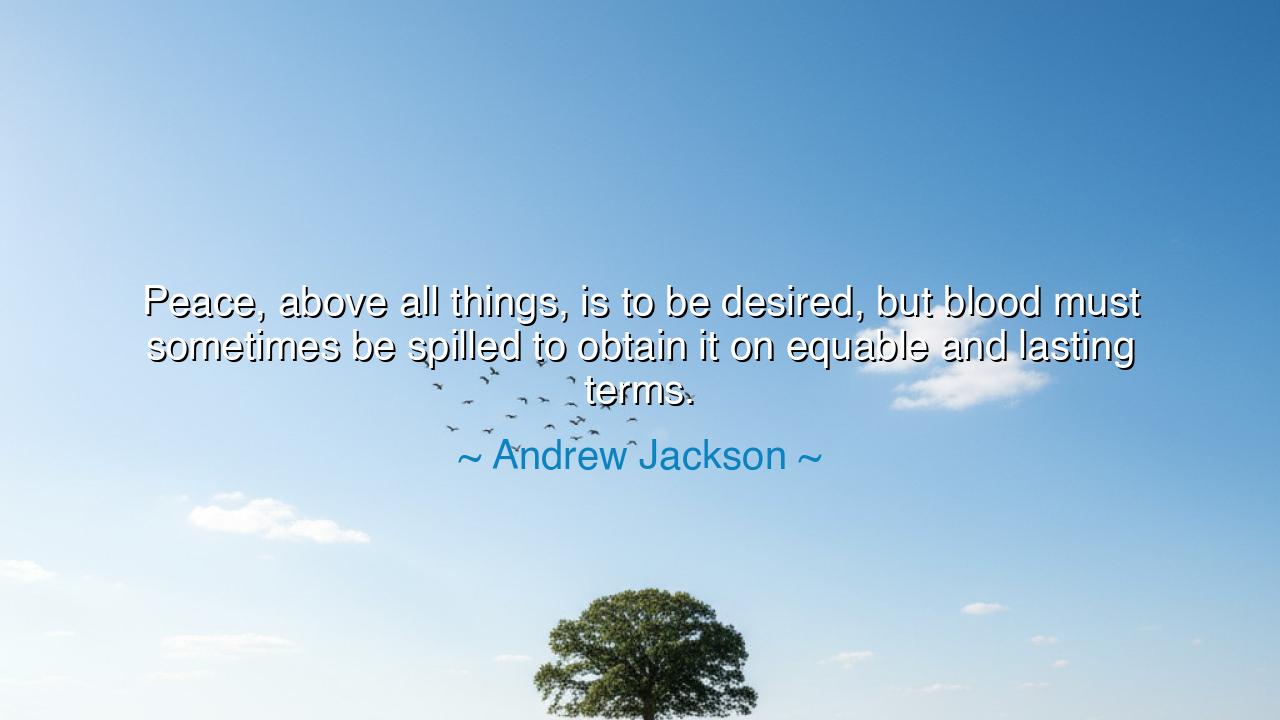
Peace, above all things, is to be desired, but blood must
Peace, above all things, is to be desired, but blood must sometimes be spilled to obtain it on equable and lasting terms.






Andrew Jackson, a man forged in the storms of the early American republic, once declared with unflinching resolve: “Peace, above all things, is to be desired, but blood must sometimes be spilled to obtain it on equable and lasting terms.” These words, weighty and grave, reveal the eternal tension between humanity’s longing for peace and the grim reality that such peace often demands sacrifice. To the ears of the untried, they may sound harsh, but to those who have lived through struggle, they carry the ring of truth, for history has often shown that harmony is purchased at a price.
When Jackson spoke of peace, he did not mean a fragile stillness bought with cowardice or submission. True peace, he reminds us, must rest upon firm foundations—justice, fairness, and balance. Without these, what appears as peace is merely a pause before new conflict. The tyrant’s silence is not peace, nor is the calm of the enslaved. Peace worth desiring must be equable and lasting, strong enough to endure the trials of time. And if such a peace cannot be freely given, it must sometimes be won through struggle.
The history of nations offers witness to this truth. Consider the American Revolution itself, a cause Jackson deeply revered. The colonists longed for peace, but the peace offered by Britain was one of taxation without representation, of obedience without voice. It was not a peace that honored dignity or freedom. And so, though they cherished peace, they spilled blood, believing that only through struggle could they secure a future where peace would rest on justice. Out of war came not endless violence, but the chance for a new republic to breathe.
Another example shines from the life of Abraham Lincoln, who a generation after Jackson was forced to face the great crisis of the Civil War. Lincoln yearned for peace, for union, for harmony among brethren. But slavery’s shadow poisoned that peace. To preserve the union and secure liberty, blood was spilled in dreadful measure. It was only through that sacrifice that a more enduring peace could be forged, one that brought the nation closer to its ideals. In Lincoln, as in Jackson, we see the harsh truth that sometimes conflict is the path to peace.
Yet let us not mistake Jackson’s words as a glorification of war. He does not say that blood should be spilled lightly, or that violence is good in itself. Rather, he reminds us that peace, though always to be desired above all, cannot be secured by mere wishful thinking. When injustice threatens, when tyranny oppresses, when cruelty denies freedom, then peace without struggle is only surrender. In those dire hours, sacrifice becomes the duty of the brave, so that future generations may inherit a world where peace has roots deep enough to endure.
The lesson for us is both sobering and empowering: cherish peace always, but understand the cost of securing it. In our personal lives, this may mean facing conflict honestly rather than sweeping it beneath the rug, confronting wrongs rather than permitting them to fester. In the life of nations, it means being willing to defend justice and dignity even when it demands courage, hardship, and sacrifice. The spilled blood of the past should not make us careless with life, but it should remind us that true peace is not bought cheaply.
Therefore, O listener, hold fast to Jackson’s wisdom: peace is the highest desire, yet it must be real, just, and enduring. If injustice reigns, if cruelty binds, then peace without struggle is a hollow shell. Be not eager for blood, but be steadfast in courage, knowing that sometimes the sword must be unsheathed so that the plow may endure. And when the struggle is over, let the memory of sacrifice teach you to treasure peace more dearly, to guard it more vigilantly, and to pass it on as a sacred gift to those who come after you. For peace is life’s sweetest fruit—but only when rooted in justice.






AAdministratorAdministrator
Welcome, honored guests. Please leave a comment, we will respond soon